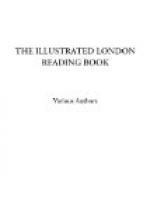’Tis past conjecture; all things rise in proof.
While o’er my limbs sleep’s soft dominion spread,
What though my soul fantastic measures trod
O’er fairy fields, or mourn’d along the gloom
Of pathless woods, or down the craggy steep
Hurl’d headlong, swam with pain the mantled pool,
Or scaled the cliff, or danced on hollow winds
With antic shapes, wild natives of the brain!
Her ceaseless flight, though devious, speaks her nature
Of subtler essence than the trodden clod:
Active, aerial, towering, unconfined,
Unfetter’d with her gross companion’s fall.
Even silent night proclaims my soul immortal:
Even silent night proclaims eternal day!
For human weal Heaven husbands all events;
Dull sleep instructs, nor sport vain dreams in vain.
YOUNG.
* * * * *
FAREWELL.
[Illustration: Letter N.]
Nay, shrink not from that
word “Farewell!”
As if ’twere friendship’s
final knell—
Such fears may
prove but vain:
So changeful is life’s
fleeting day,
Whene’er we sever, Hope
may say,
We part to meet again!
E’en the last parting
earth can know,
Brings not unutterable woe
To souls that
heav’nward soar:
For humble Faith, with steadfast
eye,
Points to a brighter world
on high,
Where hearts, that here at
parting sigh,
May meet—to part
no more!
BARTON.
[Illustration]
* * * * *
VOCABULARY OF WORDS USED IN THE ILLUSTRATED LONDON READING BOOK.
* * * * *
[We have considered that it would be useful to the young reader to have a ready means of reference, in the READING BOOK itself, to all unusual words of one syllable, and all the words of two syllables and above, that occur in the various lessons. In the following pages will be found, properly accentuated, all the more difficult polysyllables, with their meanings, derived from Johnson, Walker, and other competent authorities.]
* * * * *
ABA’NDON, v.a. give up; resign, or quit; forsake; leave
ABI’LITY, s. capacity; qualification; power
A’BJECT, a. mean; being of no hope or regard; destitute
ABLU’TION, s. the act of cleansing or
washing clean; water used in
washing
ABO’LISH, v.a. make void; put an end to; destroy
ABO’UND, v.n. have in great plenty; be in great plenty
ABRE’AST, ad. side by side
ABRU’PTLY, ad. hastily; suddenly; without the due forms of preparation




